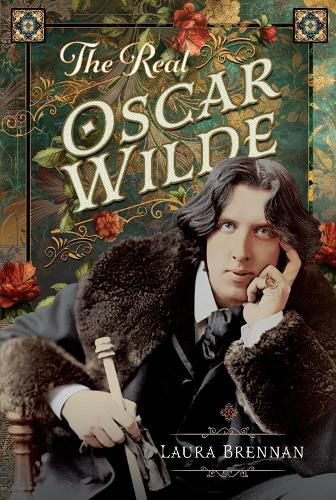Readings Newsletter
Become a Readings Member to make your shopping experience even easier.
Sign in or sign up for free!
You’re not far away from qualifying for FREE standard shipping within Australia
You’ve qualified for FREE standard shipping within Australia
The cart is loading…






Born to over achieving parents during the conservative and bourgeois Victorian period, in 1854, Oscar Fingal O'Flahertie Wills Wilde would become one of Ireland's finest poets and playwrights. The moulding of the real Oscar Wilde was shaped by his formative years, education and experiences, but he would continue to evolve and change as a poet, aesthete, a playwright, political thinker, essayist, husband, father, lover and even while he was prisoner. He was a complex and sometimes contradictory man, and was in many ways, ahead of the times in which he lived in. His professional successes including The Picture of Dorian Gray, The Importance of Being Ernest and A Woman of No Importance, to name but a few, are some of the most quoted works in modern times. But it is his personal life and the Victorian scandal that he caused in 1895 that Wilde is most remembered for today. Just after his second son was born, Wilde started to explore his sexuality. This new personal liberation and happiness would lead to meeting Lord Alfred ?Bosie? Douglas. At the height of his success, Wilde's life and the lives of his wife and children changed forever after a libel suit that lead to criminal charges and then to prison. Wilde's time as a prisoner and his life after prison were filled with physical and mental illness, sadness, tragedy and loneliness that all contributed to his death in 1900. The real Oscar Wilde can be found in the legacy of work that he left behind, the lives of his two sons, Cyril and Vyvyan, and how his story had become important to the modern LGBTQ communities well into the twenty-first century. AUTHOR: Born in London, Laura Brennan initially trained to become a journalist at Bournemouth University before gaining a BA Hons. degree in History (2:1) from London Metropolitan University in 2005. While working at BBC Outside Broadcasts, she studied part time to gain her MA in History at Queen Mary University of London 2007 to 2009. It was whilst writing her Masters dissertation that she fell in love with the Duke of Monmouth. Her previous publications for Pen and Sword are The Duke of Monmouth: Life and Rebellion (2018), Elizabeth I: The Making of a Queen (2020), and James II & VII: Britain's Last Catholic King (2023). When not writing, Laura can be found enjoying the museums and galleries of London, snuggled up with a book or planning her next adventure in Europe. 32 b/w illustrations
$9.00 standard shipping within Australia
FREE standard shipping within Australia for orders over $100.00
Express & International shipping calculated at checkout
Born to over achieving parents during the conservative and bourgeois Victorian period, in 1854, Oscar Fingal O'Flahertie Wills Wilde would become one of Ireland's finest poets and playwrights. The moulding of the real Oscar Wilde was shaped by his formative years, education and experiences, but he would continue to evolve and change as a poet, aesthete, a playwright, political thinker, essayist, husband, father, lover and even while he was prisoner. He was a complex and sometimes contradictory man, and was in many ways, ahead of the times in which he lived in. His professional successes including The Picture of Dorian Gray, The Importance of Being Ernest and A Woman of No Importance, to name but a few, are some of the most quoted works in modern times. But it is his personal life and the Victorian scandal that he caused in 1895 that Wilde is most remembered for today. Just after his second son was born, Wilde started to explore his sexuality. This new personal liberation and happiness would lead to meeting Lord Alfred ?Bosie? Douglas. At the height of his success, Wilde's life and the lives of his wife and children changed forever after a libel suit that lead to criminal charges and then to prison. Wilde's time as a prisoner and his life after prison were filled with physical and mental illness, sadness, tragedy and loneliness that all contributed to his death in 1900. The real Oscar Wilde can be found in the legacy of work that he left behind, the lives of his two sons, Cyril and Vyvyan, and how his story had become important to the modern LGBTQ communities well into the twenty-first century. AUTHOR: Born in London, Laura Brennan initially trained to become a journalist at Bournemouth University before gaining a BA Hons. degree in History (2:1) from London Metropolitan University in 2005. While working at BBC Outside Broadcasts, she studied part time to gain her MA in History at Queen Mary University of London 2007 to 2009. It was whilst writing her Masters dissertation that she fell in love with the Duke of Monmouth. Her previous publications for Pen and Sword are The Duke of Monmouth: Life and Rebellion (2018), Elizabeth I: The Making of a Queen (2020), and James II & VII: Britain's Last Catholic King (2023). When not writing, Laura can be found enjoying the museums and galleries of London, snuggled up with a book or planning her next adventure in Europe. 32 b/w illustrations